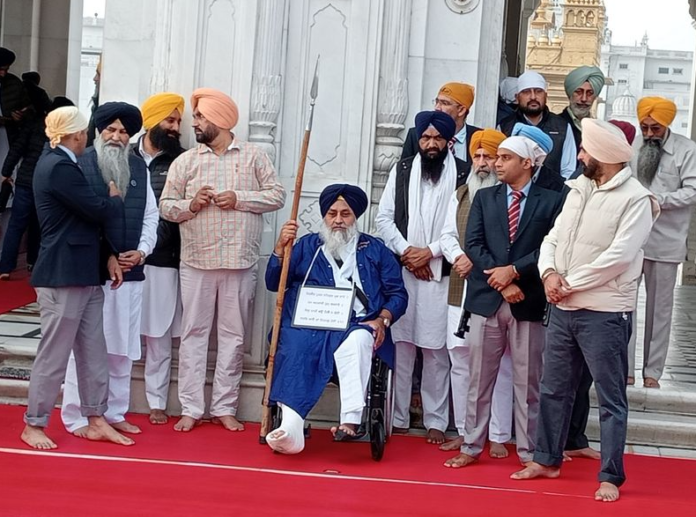Former Shiromani Akali Dal (SAD) chief Sukhbir Singh Badal commenced his penance at the Golden Temple on Tuesday, as directed by the Akal Takht, the highest temporal authority of the Sikhs. The directive followed his declaration as ‘tankhaiya’ (guilty of religious misconduct) for actions taken during the SAD government’s tenure from 2007 to 2017.
Arriving in a wheelchair due to a fractured leg, Badal was seen wearing a plaque around his neck while performing ‘sewa’ (selfless service), which included cleaning utensils and devotees’ shoes. This marked the first of several acts of penance ordered by the Akal Takht. The edict, announced by Jathedar Giani Raghbir Singh, also revoked the honorific title of ‘Fakhre-e-Qaum’ (Pride of the Community) previously bestowed on Badal’s father, late Parkash Singh Badal.
The directive also included instructions for Sukhdev Singh Dhindsa, another Akali leader, to perform similar acts of service. Both leaders were tasked with wearing the attire of a ‘sewadar’ and sitting outside the Golden Temple for an hour each over two days. Additionally, they were instructed to undertake service at other prominent Sikh shrines, including Takht Kesgarh Sahib, Takht Damdama Sahib, and Fatehgarh Sahib.
The punishment extends to other prominent Akali leaders, such as Sucha Singh Langah, Hira Singh Gabria, Balwinder Singh Bhundar, and others, who were directed to clean washrooms and serve in the community kitchen at the Golden Temple. The Jathedar emphasized that all leaders were expected to acknowledge their mistakes and fulfill the ‘tankhah’ in earnest.
This development follows nearly three months after Sukhbir Badal’s declaration as ‘tankhaiya’ and the Akal Takht’s demand for his resignation as SAD president. The working committee of the SAD has since been directed to accept his resignation and organize elections for new office-bearers within six months.
Among the issues cited was the 2007 decision to pardon Dera Sacha Sauda chief Gurmeet Ram Rahim Singh in a blasphemy case, a move that stirred widespread outrage within the Sikh community. The directives underscore the Sikh clergy’s intent to hold political leaders accountable for actions perceived as misaligned with religious principles, signaling a stern reminder of the importance of adhering to Sikh values.



